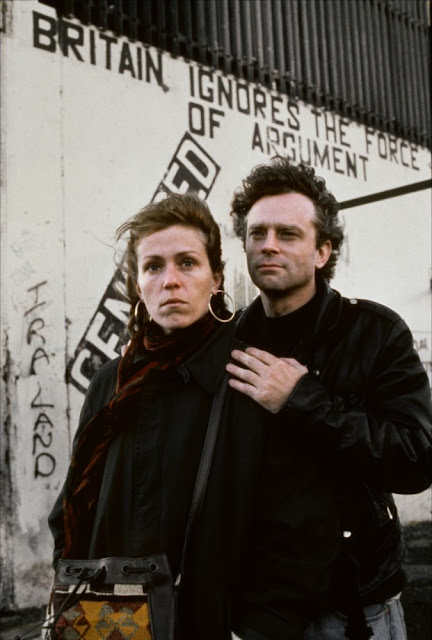Hidden Agenda
1990's HIDDEN AGENDA is one of several polemics from English director Ken Loach, though is probably the most mainstream feature on his resume. Jim Allen's screenplay is at heart a fist shake at Thatcherist England and the mistreatment handled down by British security forces in Northern Ireland, especially against those separatists in the Irish Republican Army. But, the movie also plays, at least for those who did/do not live in the U.K., as a somewhat engrossing political thriller, one of the sort where the suspense comes from clandestine meetings and loud altercations, rather than fisticuffs and chases.
Early 1980s: Paul Sullivan (Brad Dourif) is an American civil rights attorney who is a given a cassette tape containing some pretty concrete evidence of how Conservative Party members sought to have Edward Heath removed and Margaret Thatcher instated. This will cost him his life as he and an IRA sympathizer are gunned down by those acting under British authority. Sullivan's fiancee and fellow activist Ingrid (Frances McDormand), who met Paul during the Samoza regime in Chile, is left to discover why. British investigator Peter Kerrigan (Paul Cox) is brought in to make indictments, and immediately clashes with Brodie (Jim Norton), whose jurisdiction is . Ingrid and Kerrigan will become allies (and, refreshingly, not objects of each other's romantic interest) in the investigation.
Loach had shot numerous documentaries and employed that style for many of his films. HIDDEN AGENDA feels a bit slicker, slightly more polished than say, CATHY COME HOME. Many will still find this movie to be deliberately paced and talky, if not dull. I was reasonably curious throughout, feeling as if I gained some (biased) perspective on the time period depicted. It's clear where Loach (a former member of the Labour Party) and Allen's sympathies lie, and this is certainly in tone with the director's career as an advocate to tell the stories of the dispossessed, the powerless, the John Qs. He is quite interested in local color, strict yet very natural seeming authenticity.
Cox is most excellent, as is Norton. McDormand was disappointing to me, her tears and eventual outrage not entirely convincing. Dourif fares well but only has a few scenes. Stewart Copeland contributes a sometimes quick tempo score that sounds like a spy thriller, though it is used sparingly. Loach directs minimally as usual, yet makes almost everything feel cinematic. The late scene with Kerrigan and some very high up British officials (where the sad truth of everything comes into harsh focus) manages to feel like Classic Drama and a fly on the wall bit of cinema verite.



Comments